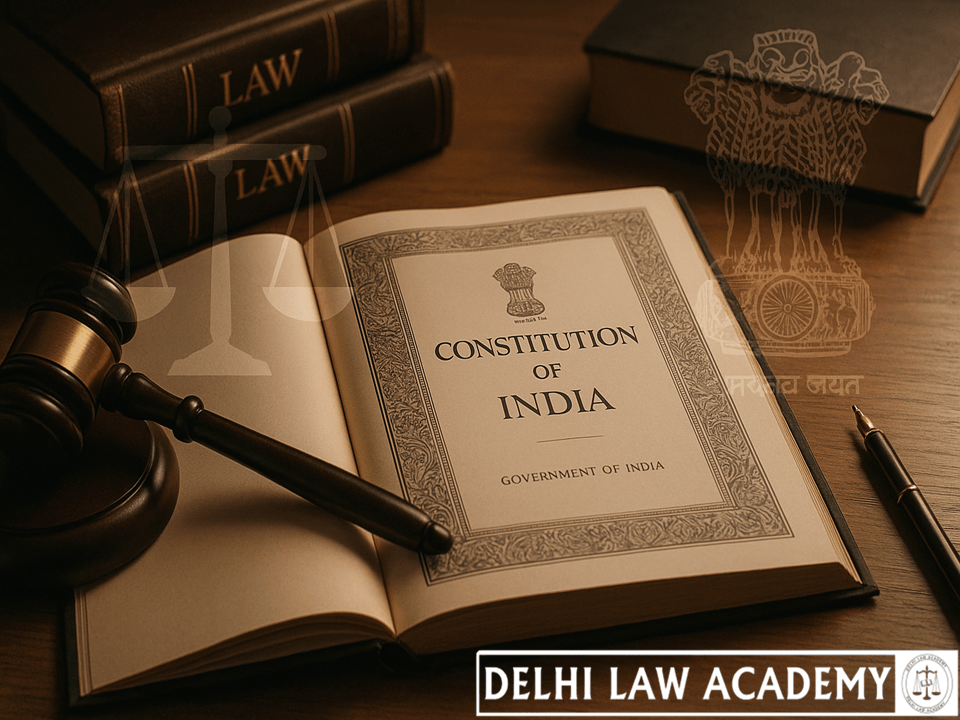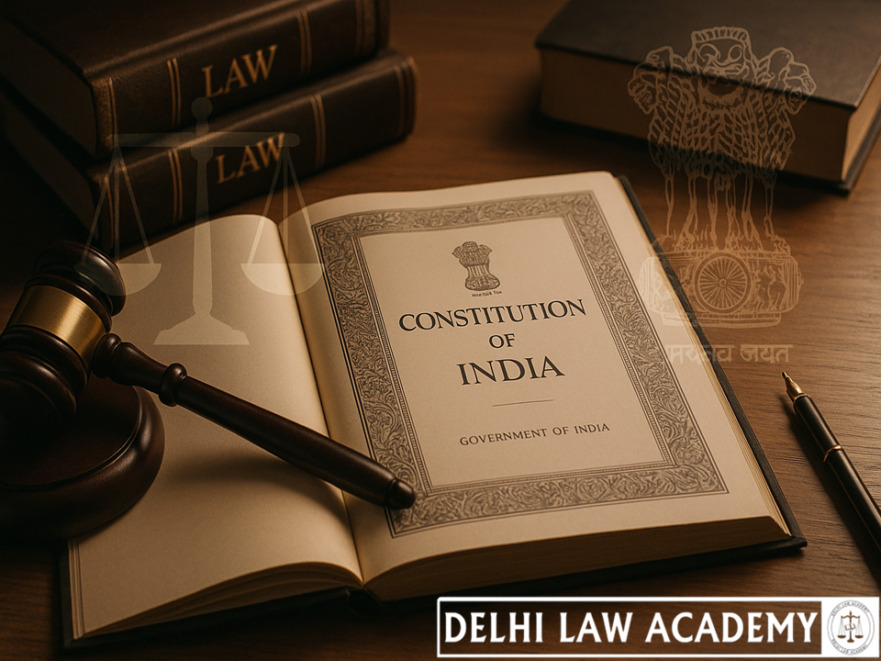
⚖️ D.C. Wadhwa v. State of Bihar [1987 SC] — Repromulgation of Ordinances
Delhi Law Academy Jaipur presents below for aspirants of RJS, DJS, PCS (J) and other Judicial Services across India a simplified and formatted version of this important Constitutional Case Law.
📌 Case Name
D.C. Wadhwa v. State of Bihar [1987 SC]
📘 Articles Involved
Articles 213
❗ Issue
- Repeated promulgation of the same Ordinance
📝 Judgment Summary
Delhi Law Academy Jaipur presents below for aspirants of RJS, DJS, PCS (J) and other Judicial Services throughout India a summarized version of the Supreme Court judgment in the case of D.C. Wadhwa v. State of Bihar [1987] striking down repeated repromulgation of ordinances by the Governor of Bihar.
D.C. Wadhwa v. State of Bihar [1987 SC]
The petitions under Article 32 of the Constitution raised the question relating to the power of the Governor under Article 213 of the Constitution to repromulgate ordinances from time to time without getting them replaced by Acts of the legislature. The question was: Can the Governor go on repromulgating Ordinances for an indefinite period of time and thus take over to himself the power of the legislature to legislate though that power was conferred on him under Article 213 only for the purpose of enabling him to take immediate action at a time when the legislative assembly of the State was not in session or when in a case where there was a Legislative Council in the State, both Houses of legislature were not in session.
The writ petitions were filed by four petitioners challenging the practice of the State of Bihar in promulgating and repromulgating Ordinances on a massive scale and in particular they challenged the constitutional validity of three different Ordinances issued by the Governor of Bihar, namely, (i) Bihar Forest Produce (Regulation of Trade) Third Ordinance, 1983, (ii) The Bihar Intermediate Education Council Third Ordinance, 1983, and (iii) The Bihar Bricks Supply (Control) Third Ordinance, 1983.
✅ Judgment
Besides Petitioner 1 is a Professor of Political Science and is deeply interested in ensuring proper implementation of the constitutional provisions. He has sufficient interest to maintain a petition under Article 32 even as a member of the public because it is a right of every citizen to insist that he should be governed by laws made in accordance with the Constitution and not laws made by the executive in violation of the constitutional provisions. The rule of law constitutes the core of our Constitution and it is the essence of the rule of law that the exercise of the power by the State whether it be the legislature or the executive or any other authority should be within the constitutional limitations and if any practice is adopted by the executive which is in flagrant and systematic violation of its constitutional limitations, Petitioner 1 as a member of the public would have sufficient interest to challenge such practice by filing a writ petition and it would be the constitutional duty of this Court to entertain the writ petition and adjudicate upon the validity of such practice. We must therefore reject the preliminary contention raised on behalf of the respondents challenging the locus of the petitioners to maintain these writ petitions.
Under the provisions of Article 213(2)(a) of the Constitution all the ordinances cease to be in force after six weeks of the date of the reassembly of the legislature. This time the session of the Legislative Assembly has begun on June 29, 1981 and that of the Legislative Council on July 1, 1981. Therefore from July 1, 1981, six weeks, that is, 42 days would be completed on August 11, 1981 and if they are not repromulgated before the aforesaid date, then all the ordinances will cease to be in force after August 11, 1981.
It is, therefore, requested that the Law Department may be contacted and immediate action be initiated to get all the concerned ordinances repromulgated so that they are definitely repromulgated before August 11, 1981.
If the old ordinances are repromulgated in their original form without any amendment, then the approval of the Council of Ministers is not necessary”.
This circular letter clearly shows beyond doubt that the repromulgation of the ordinances was done on a massive scale in a routine manner without even caring to get the ordinances replaced by Acts of the legislature or considering whether the circumstances existed which rendered it necessary for the Governor to take immediate action by way of repromulgation of the ordinances. The Government seemed to proceed on the basis that it was not necessary to introduce any legislation in the legislature but that the law could be continued to be made by the Government by having the ordinances repromulgated by the Governor from time to time. The question is whether this practice followed by the Government of Bihar could be justified as representing legitimate exercise of power of promulgating ordinances conferred on the Governor under Article 213 of the Constitution.
6. The determination of this question depends on the true interpretation of Article 213 which confers power on the Governor of a State to promulgate ordinances. The power conferred on the Governor to issue ordinances is in the nature of an emergency power which is vested in the Governor for taking immediate action where such action may become necessary at a time when the legislature is not in session. The primary law making authority under the Constitution is the legislature and not the executive but it is possible that when the legislature is not in session circumstances may arise which render it necessary, to take immediate action and in such a case in order that public interest may not suffer by reason of the inability of the legislature to make law to deal with the emergent situation, the Governor is vested with the power to promulgate ordinances. But every ordinance promulgated by the Governor must be placed before the legislature and it would cease to operate at the expiration of six weeks from the reassembly of the legislature or if before the expiration of that period a resolution disapproving it is passed by the Legislative Assembly and agreed to by the Legislative Council, if any.
The Government cannot bypass the legislature and without enacting the provisions of the ordinance into an Act of the legislature, repromulgate the ordinance as soon as the legislature is prorogued. Of course, there may be a situation where it may not be possible for the government to introduce and push through in the legislature a Bill containing the same provisions as in the ordinance, because the legislature may have too much legislative business in a particular session or the time at the disposal of the legislature in a particular session may be short, and in that event, the Governor may legitimately find that it is necessary to repromulgate the ordinance. Where such is the case, re-promulgation of the ordinance may not be open to attack. But, otherwise, it would be a colourable exercise of power on the part of the executive to continue an ordinance with substantially the same provisions beyond the period limited by the Constitution, by adopting the methodology of repromulgation.
It is settled law that a constitutional authority cannot do indirectly what it is not permitted to do directly. If there is a constitutional provision inhibiting the constitutional authority from doing an act, such provision cannot be allowed to be defeated by adoption of any subterfuge. That would be clearly a fraud on the constitutional provision.
The startling facts which we have narrated above clearly show that the executive in Bihar has almost taken over the role of the legislature in making laws, not for a limited period, but for years together in disregard of the constitutional limitations. This is clearly contrary to the constitutional scheme and it must be held to be improper and invalid. We hope and trust that such practice shall not be continued in the future and that whenever an ordinance is made and the Government wishes to continue the provisions of the ordinance in force after the assembling of the legislature, a Bill will be brought before the legislature for enacting those provisions into an Act. There must not be ordinance-Raj in the country.
8. We must accordingly strike down the Bihar Intermediate Education Council Ordinance, 1985 which is still in operation as unconstitutional and void.
📘 Stay Ahead with Delhi Law Academy!
Get access to free monthly current affairs, read our insightful blogs,
and explore free study resources prepared by experts at DLA Jaipur. 🚀
Frequently Asked Questions (FAQs)
without placing a Bill before the State Legislature.
The Supreme Court in D.C. Wadhwa v. State of Bihar (1987) held that
continuous repromulgation is a fraud on the Constitution and violates Article 213.
This bypassed the legislature and created an unconstitutional “ordinance-raj”.
The Court ruled that emergency ordinance power cannot be used for routine law-making.
If no Bill is introduced and passed during this period, the ordinance automatically lapses.
If the Legislature genuinely lacks time to take up the Bill, repromulgation may be justified.
However, doing it repeatedly as routine practice is unconstitutional.
It is meant only for situations where immediate action is necessary and the Legislature is not in session.
It cannot be used to avoid legislative scrutiny.
States must now bring Bills before the Legislature if they want laws to continue beyond the ordinance period.
Continuous repromulgation is considered unconstitutional and invalid.
Contact us
📍 Delhi Law Academy – Jaipur Branch
6C, Tower 2, Coaching Hub, Pratap Nagar, Jaipur – 302033
📞 Phone:
+91 9911916552
+91 8447285606
✉️ Email:
contactus@delhilawacademy.com

